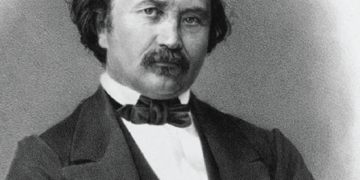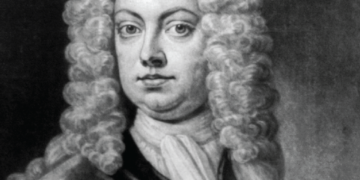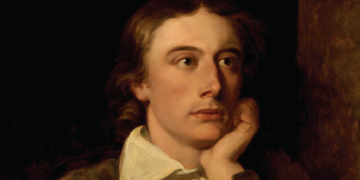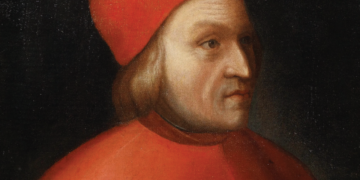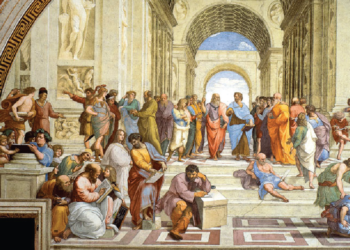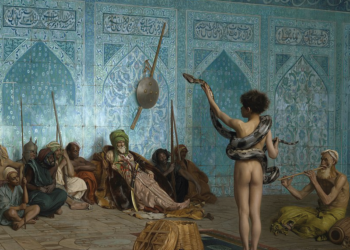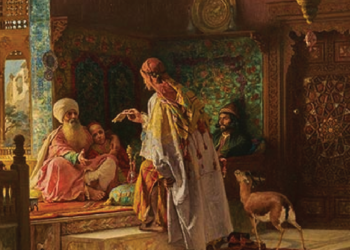Jonathan Swift
1) His Biography
Jonathan Swift’s biography is a fascinating journey through the turbulent times of 17th and 18th-century Ireland and England. Born in Dublin on November 30, 1667, Swift was the son of Jonathan Swift and Abigail Erick. Orphaned at a young age, he was taken under the care of his influential uncle, Godwin Swift. After receiving his education at Kilkenny Grammar School and later at Trinity College in Dublin, Swift ventured into the world of literature.
Despite initial setbacks, Swift’s intellectual prowess became evident when he secured a position as secretary to Sir William Temple, a diplomat and essayist. This association exposed him to the political landscape, laying the foundation for his later satirical works. Swift’s acerbic wit and sharp observations found an outlet in various pamphlets and essays, where he delved into social and political issues of the time. The most notable of these early works was “A Tale of a Tub,” a satirical masterpiece that showcased his disdain for religious hypocrisy and societal norms.
Swift’s life took a pivotal turn when he entered the clergy, eventually becoming the Dean of St. Patrick’s Cathedral in Dublin. His ecclesiastical position didn’t hinder his engagement in the political realm. Swift’s commitment to the Irish cause is evident in his powerful pamphlets such as “Drapier’s Letters,” which vehemently opposed English exploitation of Ireland. Despite his apparent loyalty to the Anglican Church, Swift’s satire spared no one, as seen in his timeless work, “Gulliver’s Travels,” where he used fantastical narratives to satirize human nature and politics.
As Swift aged, his health declined, and he withdrew from the public eye. His later years were marked by solitude, leading to the creation of his “Journal to Stella,” a series of letters addressed to Esther Johnson. These letters provide a glimpse into Swift’s personal life, revealing a complex and enigmatic personality. Swift’s biography reflects a man deeply entrenched in the socio-political issues of his time, leaving an indelible mark on literature and social commentary.
2) Main Works
A Tale of a Tub (1704):
Jonathan Swift’s “A Tale of a Tub” is a satirical masterpiece that showcases his keen wit and critical observations. Published anonymously, the work delves into religious hypocrisy and societal norms, employing a narrative framework involving three brothers who represent different branches of Christianity. The tub of the title symbolizes the vessel of religious orthodoxy, and Swift uses the tale to satirize the excesses and absurdities within various religious practices. The work is considered a bold and audacious critique of the religious establishment of Swift’s time.
Gulliver’s Travels (1726):
One of Swift’s most celebrated works, “Gulliver’s Travels” is a satirical novel that follows the adventures of Lemuel Gulliver in four fantastical lands. Through these travels, Swift satirizes human nature, politics, and the “traveller’s tales” genre itself. The fictional lands of Lilliput, Brobdingnag, Laputa, and the Houyhnhnms provide a canvas for Swift to explore and critique various aspects of society, including government, science, and human behavior. The novel is a timeless classic, known for its imaginative storytelling and profound social commentary.
Drapier’s Letters (1724-1725):
“Drapier’s Letters” comprises a series of pamphlets penned by Swift under the pseudonym M.B. Drapier. These letters vehemently opposed the exploitation of Ireland by English merchants and the imposition of Wood’s Halfpence, a copper coinage system. Swift’s passionate defense of Ireland’s economic interests struck a chord with the Irish populace, leading to widespread support and admiration. The Drapier’s Letters are a powerful example of Swift’s ability to use his pen to champion social and political causes.
The Journal to Stella (1710-1713):
Comprising a collection of letters written by Swift to Esther Johnson, whom he affectionately called Stella, “The Journal to Stella” provides a more personal and introspective look into Swift’s life. The letters, written during his time as a clergyman and political figure, reveal his inner thoughts, emotions, and the complexities of his relationships. The journal serves as a valuable historical and biographical source, shedding light on Swift’s character beyond his public persona.
The Battle of the Books (1704):
“The Battle of the Books” is a satirical work by Swift that engages in the famous Quarrel of the Ancients and Moderns. Swift uses the allegorical battle between books from classical antiquity and contemporary literature to comment on the ongoing debate about the relative merits of ancient and modern literature. The work is notable for its sharp wit and humorous depiction of the literary conflict of the time.
3) Main Themes
Satire and Social Critique:
Jonathan Swift is renowned for his masterful use of satire to critique various aspects of society. In “Gulliver’s Travels,” Swift employs satirical elements to comment on the prevailing political landscape, human nature, and societal norms. One notable aspect of Swift’s satire is his ability to create fantastical worlds that serve as mirrors to contemporary society. In Lilliput, for example, the absurdity of court politics and trivial conflicts is highlighted through the miniature size of the characters.
Swift’s original contribution lies in his use of satire as a tool for social and political commentary, a technique that influenced later writers such as Voltaire and Mark Twain. The biting irony in Swift’s works, like “A Modest Proposal,” where he suggests eating infants to solve poverty, stands as a bold and innovative approach to highlighting societal issues through shock value.
Religious Critique and Morality:
Swift’s engagement with religious themes is evident in works like “A Tale of a Tub” and various satirical essays. In “A Tale of a Tub,” Swift critiques religious hypocrisy by portraying three brothers representing the divisions within Christianity. The work challenges conventional religious narratives and dogma, exploring the tension between reason and faith.
Swift’s original contribution to religious critique lies in his audacious dismantling of religious institutions, presenting a perspective that questioned the established norms of his time. His approach stands in contrast to more traditional religious writers, paving the way for later thinkers like Voltaire and Hume, who continued to question and challenge religious orthodoxy.
Political Allegory and Critique:
Swift’s works often serve as political allegories, using fictional settings to comment on contemporary political issues. “Gulliver’s Travels” is a prime example, where the author presents a multifaceted critique of politics through the lens of fantastical lands. In Lilliput, Swift satirizes the pettiness of political conflicts, while in Brobdingnag, he highlights the dangers of unchecked power.
Swift’s original contribution lies in his ability to convey complex political ideas through imaginative storytelling. His use of allegory influenced later writers such as George Orwell, who employed similar techniques in works like “Animal Farm” to critique political ideologies. Swift’s satire transcends mere entertainment, serving as a powerful medium for political introspection and critique.
National Identity and Patriotism:
In “Drapier’s Letters,” Swift passionately defends Irish interests against English exploitation, specifically addressing economic issues like the imposition of Wood’s Halfpence. Swift’s original contribution in this theme is his explicit advocacy for Irish nationalism and the protection of Ireland’s economic sovereignty. His writings galvanized public sentiment, fostering a sense of national identity and pride.
Swift’s approach stands in contrast to other writers of his time, as he prioritized the interests of Ireland over personal gain or allegiance to the English crown. This emphasis on national identity and patriotism resonates with later nationalist movements and writers who championed the cause of oppressed nations.
Human Nature and Rationality:
Swift’s exploration of human nature is a recurring theme in his works, particularly evident in “Gulliver’s Travels.” The depiction of the Houyhnhnms, rational and intelligent horses, and the degraded Yahoos, representing the worst aspects of humanity, serves as a profound commentary on reason and irrationality.
Swift’s original contribution lies in his nuanced portrayal of the flaws inherent in human nature, challenging the optimistic views of human reason prevalent during the Enlightenment. His exploration of the duality of human character influenced later philosophers like Rousseau, who also grappled with the complexities of human nature. Swift’s skeptical view of unfettered reason and his emphasis on the darker aspects of human behavior set him apart as a thinker who dared to question prevailing philosophical optimism.
4) His Critique of Politics
Jonathan Swift’s incisive critique of politics is a recurring theme throughout his works, revealing a deep-seated skepticism towards the political establishments of his time. Swift’s satirical approach to politics is evident in pieces such as “Gulliver’s Travels” and various pamphlets like “The Conduct of the Allies.” One aspect of his critique lies in his portrayal of political figures and institutions as inherently flawed and self-serving.
In “Gulliver’s Travels,” Swift uses the fictional lands visited by Lemuel Gulliver as allegories for the political landscape. The court intrigues of Lilliput satirize the triviality of political conflicts, emphasizing how personal interests often overshadow the greater good. This approach was innovative for Swift’s time, as he dared to present political figures in unflattering and absurd lights, challenging the prevailing norms of deference.
Swift’s critique also extends to the broader political climate of his era. In “The Conduct of the Allies,” he scrutinizes the diplomatic and military strategies employed during the War of Spanish Succession. Swift’s original contribution to political critique lies in his ability to dissect and lambast the decisions of those in power, offering a perspective that questioned the motives behind political actions.
Moreover, Swift’s political writings, such as the “Drapier’s Letters,” showcase his commitment to championing the interests of Ireland against English exploitation. His critique of economic policies and the imposition of Wood’s Halfpence reflects not only his opposition to specific measures but also his broader stance against the oppressive political apparatus. Swift’s influence in this regard is seen in later writers who used satire as a tool to critique political structures, with echoes found in the works of George Orwell and his exploration of totalitarian regimes.
Swift’s critique of politics goes beyond mere satire; it is a profound examination of power dynamics, political maneuvering, and the impact of decisions on the common people. His courage to challenge authority and expose political folly has left an enduring legacy, inspiring generations of writers to use literature as a means to question and critique the political status quo.
5) His Legacy
Jonathan Swift’s legacy extends far beyond the bounds of his lifetime, leaving an indelible mark on literature, satire, and political discourse. Swift’s influence is evident in the enduring popularity and relevance of his works, as well as the impact he had on subsequent generations of writers.
Swift’s satirical masterpieces, such as “Gulliver’s Travels” and “A Modest Proposal,” continue to be studied and admired for their wit, depth, and timeless relevance. The enduring popularity of “Gulliver’s Travels,” with its imaginative storytelling and profound social commentary, attests to Swift’s ability to capture the complexities of the human condition. His satirical techniques, including irony and allegory, have become enduring elements in the literary toolbox, influencing writers ranging from Voltaire and Mark Twain to George Orwell and beyond.
Swift’s legacy also resonates in the realm of political satire and commentary. His courage to critique political and religious institutions paved the way for later writers who dared to question authority. George Orwell, in particular, drew inspiration from Swift’s satirical approach when penning works like “Animal Farm” and “1984.” Swift’s commitment to social justice, as seen in the “Drapier’s Letters,” laid the groundwork for future writers who sought to use their voices to advocate for political change.
Beyond literature, Swift’s influence extends into the field of political philosophy. His exploration of human nature, reason, and the flaws inherent in political systems has sparked ongoing debates. Swift’s skeptical view of unchecked optimism in the Enlightenment era found echoes in the works of later philosophers like Jean-Jacques Rousseau, who grappled with the complexities of human nature and society.
Swift’s legacy is not confined to his written works alone; his impact on the development of the English language is substantial. His mastery of language, wit, and linguistic innovation continue to inspire writers and linguists. Phrases such as “Yahoo” and “Big-Endians” from “Gulliver’s Travels” have entered the lexicon, attesting to the enduring influence of Swift’s imaginative creations.
In the realm of Irish literature and nationalism, Swift stands as a figure who passionately defended Ireland’s interests against English exploitation. His advocacy for Irish economic sovereignty in the “Drapier’s Letters” contributed to a sense of national pride and identity. Swift’s legacy in Ireland is celebrated, and his impact on the nation’s cultural and political consciousness is acknowledged with reverence.
Swift’s personal life, including his complex relationships and the enigmatic “Journal to Stella,” adds another layer to his legacy. The exploration of his inner thoughts and emotions in these letters provides a rich source for biographers and scholars seeking to understand the man behind the satirical pen.
6) Some Quotes
“Satire is a sort of glass, wherein beholders do generally discover everybody’s face but their own.” – Jonathan Swift
“Vision is the art of seeing what is invisible to others.” – Jonathan Swift
“A wise person should have money in their head, but not in their heart.” – Jonathan Swift
“I never wonder to see men wicked, but I often wonder to see them not ashamed.” – Jonathan Swift
“When a true genius appears in the world, you may know him by this sign, that the dunces are all in confederacy against him.” – Jonathan Swift


